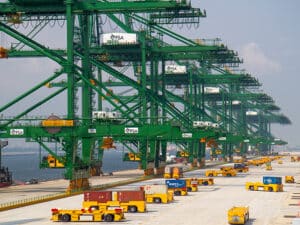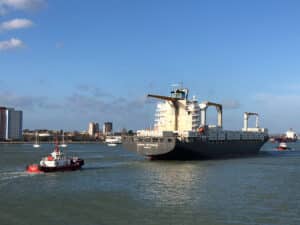
7 tips for ports on business interruption insurance
Written by Heather Ervin
Port operators will benefit from working with a skilled broker to help find cover that caters for all eventualities.
By Ed McNamara, Armada Risk Partners
In these uncertain times, ports across the globe face multiple business interruption threats. It’s a lengthy list that includes strikes and political protests, cyber-attacks, ship collisions, natural disasters and supply chain disruption.
The threats are only too real, as recent events have shown. A week-long strike by operators of locks on the St. Lawrence Seaway at the end of 2023 is estimated to have cost the U.S. and Canadian economies more than $70 million a day.
During the eight-day shutdown about 150 ships, both lake freighters and ocean-going vessels, were affected.
In January 2024, it was reported that an industrial dispute at some of Australia’s biggest ports that began in October 2023 was causing costly delays and supply chain disruptions, with a backlog of tens of thousands of containers building up.
Container shipping flows to the U.S. were also affected by labor negotiations in 2023, with predictions of more union action by dockworkers this year creating yet more disruption.
When it comes to political protests, in Australia in November 2023, more than 3,000 kayaking environmental protestors took part in a 30-hour blockage of Newcastle coal port’s shipping lanes ahead of the COP28 summit.
Ports also continue to be affected by the “Great Supply Chain Disruption.” A range of post-pandemic issues, including a shortage of shipping containers in China and a lack of truck drivers to move goods, are leading to cargo piling up at ports and ships stuck in queues waiting to unload.
In late 2023, multiple Australian ports came under cyber-attack with terminals in Melbourne, Sydney, Brisbane and Perth disrupted across four days. This echoed a breach in which cyber-attacks hit three Canadian ports. Similarly, a breach of the Port of Lisbon led to confidential information being published online.
Against these various business interruption threats, how can port operators ensure they get the best insurance available and are fully covered?
It is essential that they work with insurance professionals specializing in maritime and port-related risks to create a customized insurance package that addresses the unique risks and challenges faced by the port and its activities.
That includes tailoring coverage limits and deductibles to align with the specific needs of the business.
Port operators will benefit from working with a skilled broker to help find cover that caters for all eventualities.
Regular risk assessments are also vitally important to identify potential vulnerabilities and implement risk mitigation strategies. Insurers may offer better terms to businesses with robust risk management practices.
To help, here are some key insurance recommendations:
1. Business Interruption Insurance:
Port operations need to secure business interruption insurance that covers income losses resulting from disruptions caused by strikes, protests, or other events. This can include coverage for lost revenue, extra expenses, and ongoing operating costs during the interruption period.
2. Property Insurance:
It is vital to ensure that the port’s physical assets, including terminals, warehouses, and equipment, are adequately covered by property insurance. This should include coverage for damages caused by ship collisions, natural disasters, or other physical perils.
3. Marine Insurance:
Marine insurance policies should cover damages to vessels, including collisions in the port area. This can include hull and machinery insurance, protection and indemnity (P&I) insurance, and cargo insurance for goods in transit.
4. Liability Insurance:
Liability insurance is needed protect the port against legal claims arising from accidents, collisions, or injuries that occur on the premises. This can include third-party liability coverage for damage to other vessels, infrastructure, or injuries to individuals.
5. Political Risk Insurance:
Consider political risk insurance to protect against losses occurring as a result of strikes, protests, or other political events that may disrupt business operations. Think of Russia’s war with Ukraine, or tensions between the US and China or conflict in the Middle East. These kind of dynamics can have a big impact on ports that for example have investors from countries that could be affected by sanctions.
6. Contingent Business Interruption Insurance:
Contingent business interruption insurance is used to cover losses resulting from disruptions to key suppliers or customers. This can be really crucial if a port relies on specific suppliers for its operations.
7. Cyber Insurance:
Cyber insurance is essential to protect against cyber threats and attacks that could disrupt port operations, leading to business interruption. Hosting large numbers of vessels operated by companies employing a range of IT systems provides a perfect environment for cyber-attacks.
For other contributions from Armada Risk Partners, click here.




